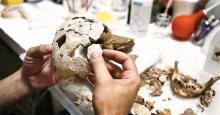Thucydides
Thucydides’ trap and Trump’s pit
Thucydides described the cause of the Peloponnesian War as the inevitable clash between the established power at the time, Sparta, and the rising power, Athens. This so-called "Thucydides trap" has been used a lot lately as an analytical tool for the dangers inherent in the rising US-China rivalry. The US elections, however, showed that similar, dangerous dynamics can develop domestically.
- Read more about Thucydides’ trap and Trump’s pit
- Log in to post comments
Use of UAVs will ‘almost certainly’ increase, says strategic studies professor
"The use of unmanned devices in the air, at sea and on land is almost certainly going to increase," Andrew Novo, professor of strategic studies at the National Defense University, Washington, DC tells Kathimerini in an interview.
Thucydides, NATO and the new era of great power politics
The last decade Thucydides has moved to the center of the discussion, with concepts like the "Thucydides trap" debated in policy circles in Washington, DC when looking at how to navigate US relations with a rising China in what appears to be a new era of great power competition.
So what can Thucydides tell us about our world today?
Yale strengthens ties with University of Athens
Pericles Lewis, Douglas Tracy Smith Professor of Comparative Literature and Professor of English at Yale University, serves as dean of Yale College. He owes his Greek name to his father's love for the Greek historian Thucydides.
- Read more about Yale strengthens ties with University of Athens
- Log in to post comments
Lessons of War II | Athens | May 7-10 & 12-14
Yiannis Lignadis' "Lessons of War II: The Sicilian Dramas" is the second part of an original dramatization of Thucydides' "History of the Peloponnesian War." Directed by Dimitris Lignadis, the play draws material from the sixth, seventh and part of the eighth book of Thucydides' "History," presenting key aspects of the war's second phase, the Sicilian Expedition (415-413 BC), which resulted in
- Read more about Lessons of War II | Athens | May 7-10 & 12-14
- Log in to post comments
Lessons of War | Athens | To December 18
In "Lessons of War" writer Yiannis Lignadis and director Dimitris Lignadis attempt to hone in on the essence of the tragedy of war with an original dramatization of excerpts from the first five books of Thucydides' "History of the Peloponnesian War." Performances take place at the Athens Concert Hall on November 13, 20 and 27, and December 3, 11 and 18, starting at 9 p.m.
- Read more about Lessons of War | Athens | To December 18
- Log in to post comments
Thucydides the Athenian | Athens | June 26-29
A three-day conference on "Thucydides the Athenian," will take place at DIKEMES/College Year in Athens from June 26 to 29.
The conference aims to examine Thucydides within the Athenian context: exploring his political entourage and intellectual content. An international group of scholars will delve deeper into the realities of Periclean ideology and the post-Periclean legacy.
- Read more about Thucydides the Athenian | Athens | June 26-29
- Log in to post comments
Archaeologists go high-tech in 2,500-year-old Greek cold case
More than 2,500 years ago, an Athenian nobleman named Cylon -- the first recorded Olympic champion -- tried to take over the city of Athens and install himself as its sole ruler.
According to Thucydides and Herodotus, Athenian and Greek historians who wrote about the coup, Cylon enticed an army of followers to enter the city and lay siege to the Acropolis.
Why the White House is reading Greek History
The Trump White House isn’t known as a hot spot for Ivy League intellectuals. But last month, a Harvard academic slipped into the White House complex for an unusual meeting.
- Read more about Why the White House is reading Greek History
- Log in to post comments
The plague of Ancient Greece could have been ebola
Summer 430 B.C. A plague hit Ancient Athens, ravaging the city’s population according to Thucydides’ Historyof the Peloponnesian War.
- Read more about The plague of Ancient Greece could have been ebola
- Log in to post comments









